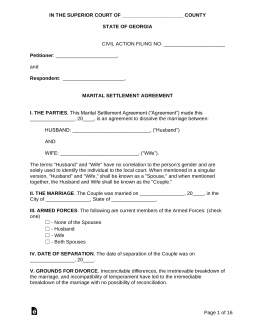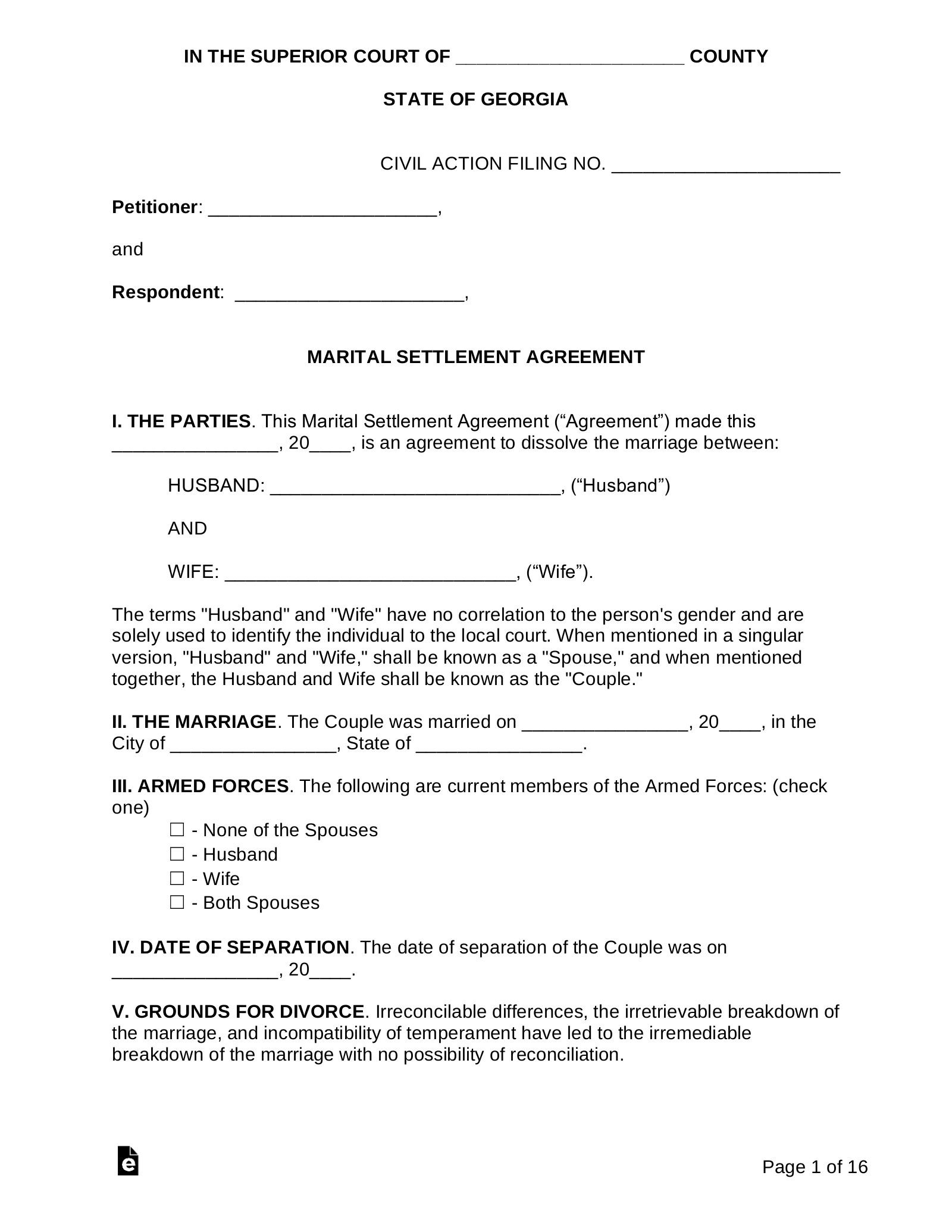Updated November 28, 2023
A Georgia marital settlement agreement is a legal document that defines a couple’s choices regarding the separation of marital property and their post-marriage rights. Spouses can begin negotiating the settlement terms after providing each other with a comprehensive report of their current finances. By revealing their income, assets, and debts, the parties may establish stipulations for alimony and child support that are fair to both individuals. The agreement should also describe how real estate, motor vehicles, household items, and all other personal property shall be divided after marriage. Once signed and notarized, the agreement may be incorporated into the divorce proceedings and made enforceable by order of the court.
Table of Contents |
Divorce Laws
Statutes – Title 19, Chapter 5 (Divorce)
Alimony
The following factors shall be considered by the court to determine the amount of alimony granted to a spouse:
- The living standard the couple established while married;
- The term of the marriage;
- The age and the physical and emotional state of each spouse;
- Each spouse’s financial resources;
- The time required for either spouse to obtain sufficient training or education to find suitable employment;
- The contributions made by each spouse during the marriage (e.g., child care, education, homemaking);
- Each spouse’s condition, including their earning capacity, separate estate, and fixed liabilities; and
- Other relevant factors. (§ 19-6-5)
Child Support
In Georgia, child support payments are calculated based on income and number of children. (§ 19-6-15)
Division of Property
Georgia courts use equitable distribution law to distribute marital property between spouses. This means that shared property will not be divided equally, but will instead be divided in a manner the court deems fair and just. (§ 19-5-13)
Grounds for Divorce
A divorce may be granted if any of the following grounds are met:
- Intermarriage by individuals with prohibited degrees of relation;
- Impotence at the start of marriage;
- Marriage obtained by fraud, duress, menace, or force;
- Pregnancy at the start of the marriage by another man who is unknown to the husband;
- Adultery after marriage;
- Willful desertion of a spouse for one year or longer;
- A conviction of moral turpitude for which the spouse is sentenced to imprisonment for two years or longer;
- Habitual drunkenness;
- Wilful harm causing a reasonable threat of danger to a spouse;
- A qualifying, incurable mental illness;
- Habitual addiction to a controlled substance; and
- The irretrievable breakdown of the marriage. (§ 19-5-3)
Interim Support
While an action for divorce is pending, a spouse may apply for temporary alimony to meet their needs until the divorce is finalized. (§ 19-6-3)
Residency
Individuals must reside in Georgia for six months before filing for divorce. If a non-resident wishes to divorce a resident of Georgia, the action must be filed in the county where the respondent has resided for six months. (§ 19-5-2)
Divorce Forms
The party filing for divorce (the “plaintiff”) can obtain the divorce paperwork from the superior court in the county where either they or their spouse (the “defendant”) has continuously resided for at least six (6) months. The self-help centers listed below offer filing packets and instructions for divorce. For all counties, the plaintiff should contact their local superior court to find the forms used in their county.
- Where to File – Superior Court
- Filing Fee – Around $200 to $220
- How Long Does it Take? 45-60 days
Self-Help Centers for Metro-Atlanta:
- Fulton County Family Law Info Center
- Dekalb County Family Law Information Center
- Clayton County Courts Law Library
- Gwinnett Family Law Center
Self-Help Centers Outside of Metro-Atlanta:
- Southern Judicial Circuit
- Chattahoochee Family Law Center
- Appalachian Family Law Information Center
- Dougherty County Forms
- Griffin Family Law Center
Example – Divorce Court Forms (Southern Judicial Circuit of Georgia)
The instructions provided in the guide below pertain to uncontested divorces in Fulton County. If filing elsewhere, the plaintiff can obtain the requisite paperwork from the superior court with jurisdiction in their county.
How to File for Divorce in Georgia (8 steps)
- Petition for Divorce
- Financial Disclosure
- Parenting Documents
- Settlement Agreement
- Serve Petition on Defendant
- Answer Petition
- Court’s Decision
- Change Name
1. Petition for Divorce

The plaintiff will need to complete either a Petition for Divorce without Children or Petition for Divorce with Minor Children. Once prepared, the petition must be signed in the presence of a notary public. The plaintiff must then fill out a Domestic Relations Case Filing Information Form and an Automatic Domestic Standing Order.
2. Financial Disclosure

In uncontested divorce cases, the spouses must agree on all the terms of their separation, including alimony, child custody rights, child support, and the division of shared property and assets. The parties should begin negotiating their divorce by disclosing their income, assets, debts, and expenses. Each spouse must then record their financial information in separate Domestic Relations Financial Affidavits, which they must sign in the presence of a notary public.
3. Parenting Documents

To determine a parent’s child support obligations, the parties will need to navigate through the instructions on Georgia’s Online Child Support Calculator and prepare a Child Support Worksheet. Parents must then define their parental responsibilities and child support obligations in a Parenting Plan (must be notarized) and a Child Support Addendum.
4. Settlement Agreement

After the parties negotiate the terms of their separation, they must draft either a Settlement Agreement without Children or Settlement Agreement with Children and sign it in the presence of a notary public. The plaintiff must make two (2) copies of each divorce document and file them with the superior court. A fee of approximately $200 to $220 will be charged to the plaintiff. Those who cannot afford the fee can ask the court for an exemption by filing a notarized Poverty Affidavit.
5. Serve Petition on Defendant

The superior court requires the plaintiff to formally deliver, or “serve,” the Petition for Divorce on the defendant. After the petition has been delivered, the plaintiff must file a document proving that service took place. The petition can be served using either of the following methods:
- Personal Service
- The plaintiff can personally deliver the Petition for Divorce to the defendant. The defendant will fill out an Acknowledgment of Service and sign it in the presence of a notary public. The plaintiff must file the Acknowledgment of Service with the superior court.
- Third-Party Service
- The plaintiff must obtain an Entry of Service and two (2) copies of a Summons from a clerk of the court. One (1) Summons needs to be attached to the original Petition for Divorce while the other Summons and the Entry of Service must be attached to a copy of the Petition for Divorce. All documents must be submitted to a clerk who, for a fee, will ask the sheriff to serve the documents on the defendant. A service sheet will be returned to the plaintiff which they must file with the court.
After the Petition for Divorce is served on the defendant, each spouse must appear before a notary public, sign a Consent to Trial 31 Days After Service, and file it with the court.
6. Answer Petition

The defendant may need to file an Answer and Counterclaim with the court to state whether they agree with the plaintiff’s claims (in an uncontested divorce case, the defendant and plaintiff must agree on all divorce-related issues). Generally, the response must be given within thirty (30) days after the divorce papers were served. The defendant’s answer must be notarized, and a copy must be sent to the plaintiff via standard mail.
7. Court’s Decision

A judge of the superior court will review the case information to decide whether a divorce should be awarded. Some judges may require the parties to attend a hearing or trial to provide additional statements and evidence. It might also be necessary for the couple to attend mediation, although this is less likely in uncontested cases. If the couple is granted a divorce, the judge will issue the parties a Final Judgment and Decree.
8. Change Name

Either party in a divorce action may ask the court to restore their prior or maiden name. If this request was made, the new name will be stated on the divorce decree which may then be used as evidence of the change.


